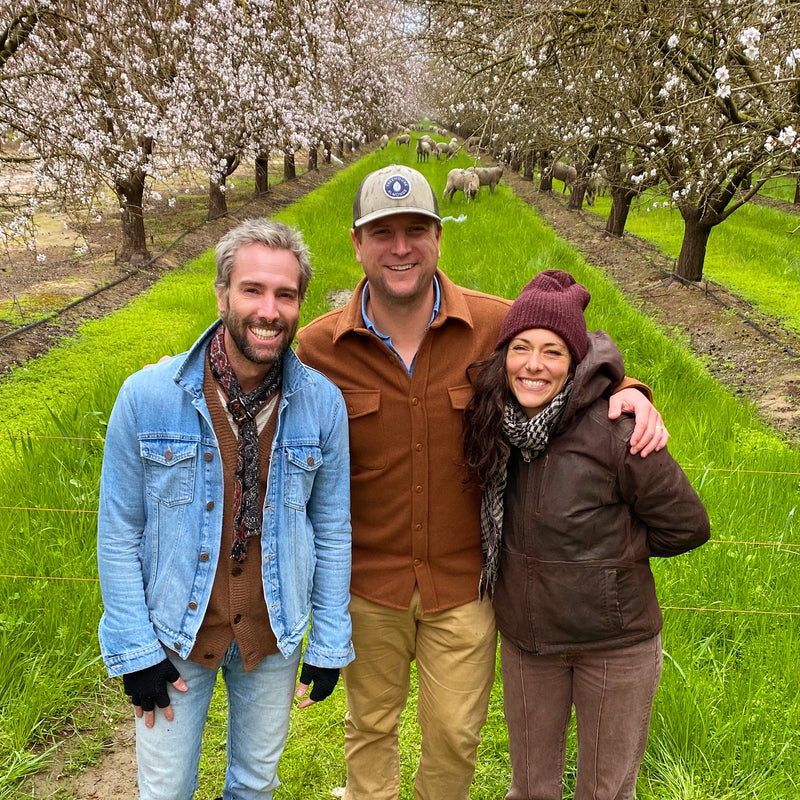
Benjamin Frolichstein (Cappello's Co-Founder/CEO), Joe Gardiner from Treehouse California Almonds & Pacific Ag, and Stacey Marcellus in the orchard
"Can you imagine a world where the act of eating food or buying products leaves the land with more life than it takes away?"
A world where consumption supports community abundance and health? If we can’t begin to imagine what that might look and feel like, it’s going to be awfully hard to bring it into existence. Some people might say it’s a pipe dream, and while we have a long way to go for this reality to be the norm, I see it as a very worthy aim to work towards.
Not too long ago, some damning information was being passed around about the quantity of water almonds require to grow. While it’s true that almond trees can be water intensive, a lot of context was missing from this soundbite. I learned that if you were to compare crops on a calorie-to-calorie basis, almonds don’t take more water to grow than many common crops, especially when you take into consideration relative factors like spoilage. This single data point seriously impacted the almond growing communities in California and Oregon and highlighted a human tendency to take one piece of information and form an incomplete perspective.
"It reflected the importance of taking the time to go deeper."
When we seek to understand the people and systems that exist, we learn the history and reasoning behind what is. From this place, we can increase our understanding, our level of respect, and our reverence. This is a key ingredient in building our capacity as humans to work together to evolve the systems we inherited— in the case of Cappello’s, the food system along with everything and everybody it's in relationship with.

Joe Gardiner, Treehouse California Almonds + Pacific Ag Management
As a brand who calls on almonds to help us bring nutrition into the foods we love most, the last thing we wanted to do was desert our best buddy. We wanted to lean into our friendship. Needless to say, when we heard there was a farmer-led regenerative project forming with one of our almond growers, we were quick to try to get involved.
What makes The Almond Project unique is that it’s a multi-stakeholder project. We have Treehouse (the grower and processor), three food brands (Cappello’s, Simple Mills, and Daily Harvest), and White Buffalo Land Trust. We’re working together in a pre-competitive fashion towards the collective aim of growing almonds in a way that truly nourishes the communities around them, and regenerates the land and ecosystems in the Central Valley where they grow. We have so much more power when we come together, pool resources, and push each other’s thinking. It feels crazy to work on planetary health in any other way. It’s what we all have in common, it’s what provides us with everything we have.

Members of White Buffalo Land Trust, Treehouse Almonds, Pacific Ag Management, Simple Mills, Daily Harvest and Cappello's
The Almond Project and the people we’ve met as a result, have helped our team begin to evolve how we partner across all parts of our supply system. It’s also helped us begin to transform our business into one that works from a living systems paradigm, and has invited to reflect often and become more aware of our consciousness. We are being called to put our mechanistic and competitive mindsets on the sidelines so we can work together to ensure a bright and resilient future for everyone.
We just celebrated The Almond Project's one year anniversary over a beautiful almond bloom with our friends at Treehouse. We were able to participate in various soil tests and were blown away by what we saw after just one year of Treehouse integrating cover crops, compost, and grazing sheep into the orchards. It was pouring rain all day and there were concerns about standing water being an issue. On the 160 acres allocated to the project, the rain was completely absorbing into the ground, a stark difference to the adjacent acres where you’d see puddling and runoff.
"Every test we performed clearly demonstrated a marked difference in the soil's health, water retention, structure, and organism diversity — not to mention the humming of birds and bees."

Water retention tests with Dr. Jeffrey Mitchell

Dr. Jessica Chiartas holding a sample of this year's soil
"By avoiding the natural tendency to pre-judge success, it creates space for potential that we may not be able to see today."
One of the unique qualities of this project is that we aren’t imposing upon it a set of specific standards or outcomes. By avoiding the natural tendency to pre-judge success, it creates space for potential that we may not be able to see today. That said, we are working with scientists from UC Davis and Land to Market, an arm of The Savory Institute, to perform annual Ecological Outcome Verifications so we can collect scientific data to share with the industry as this land changes.
“We’re not growing almonds, we’re growing trees.”
Joe from Treehouse said it best, “we’re not growing almonds, we’re growing trees.” This statement was a heartfelt nod to thinking about things as whole living systems rather than a collection of disconnected parts. Working regeneratively is not a new idea. This is old wisdom that has existed in indigenous communities and is also embedded deep in our cellular memory. The more I work in this way in our business and in my own life, the more it feels like I remember who I am. It feels like coming home to a house I adore.
<3 Stacey